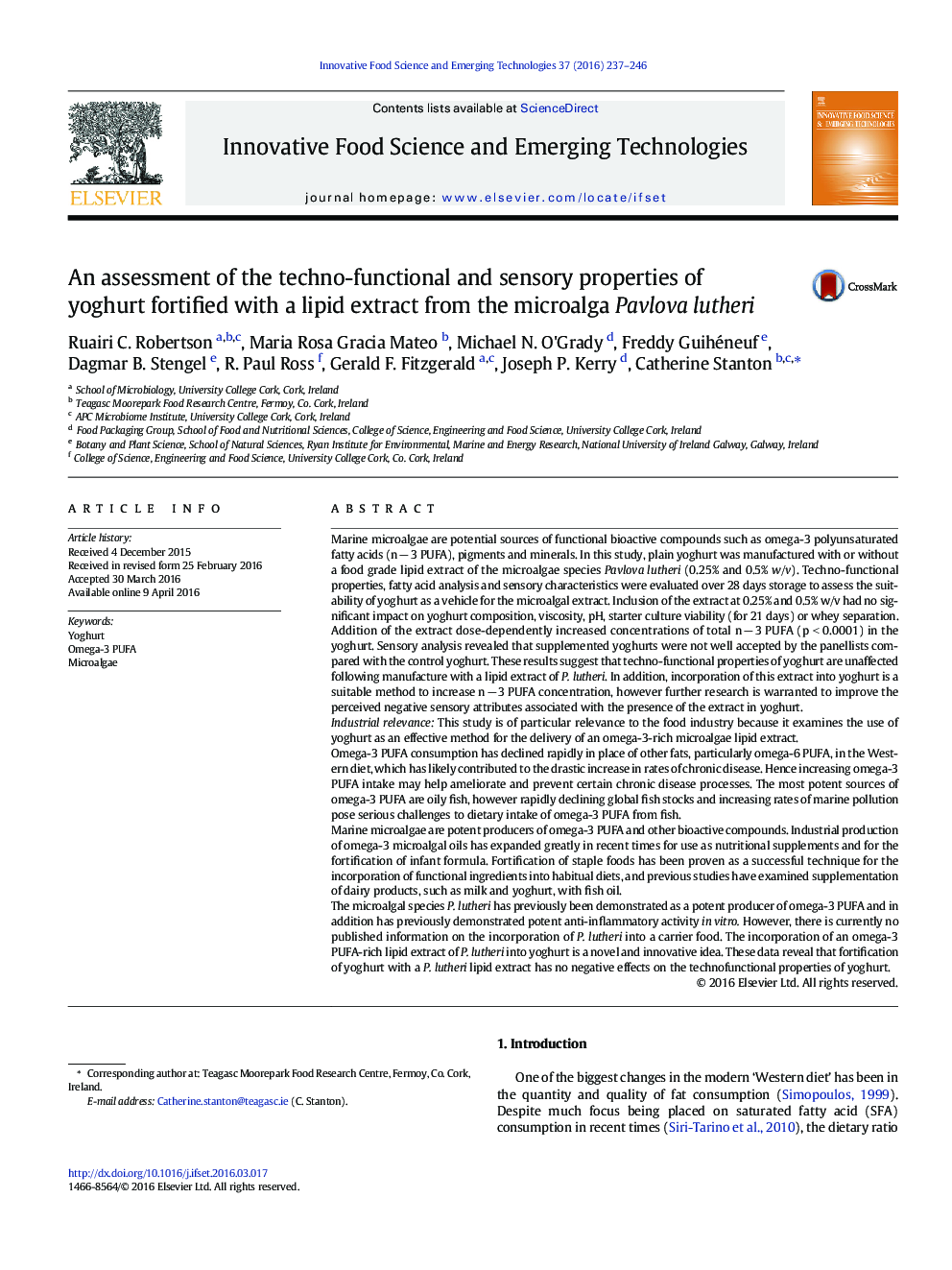| کد مقاله | کد نشریه | سال انتشار | مقاله انگلیسی | نسخه تمام متن |
|---|---|---|---|---|
| 5521811 | 1401278 | 2016 | 10 صفحه PDF | دانلود رایگان |

- Yoghurt was manufactured with an omega-3-rich lipid extract of the microalgae P. lutheri.
- The extract had no effect on techno-functinal properties of the yoghurt and increased omega-3 content.
- Sensory analysis revealed that the fortified yoghurt was not well accepted.
Marine microalgae are potential sources of functional bioactive compounds such as omega-3 polyunsaturated fatty acids (n â 3 PUFA), pigments and minerals. In this study, plain yoghurt was manufactured with or without a food grade lipid extract of the microalgae species Pavlova lutheri (0.25% and 0.5% w/v). Techno-functional properties, fatty acid analysis and sensory characteristics were evaluated over 28 days storage to assess the suitability of yoghurt as a vehicle for the microalgal extract. Inclusion of the extract at 0.25% and 0.5% w/v had no significant impact on yoghurt composition, viscosity, pH, starter culture viability (for 21 days) or whey separation. Addition of the extract dose-dependently increased concentrations of total n â 3 PUFA (p < 0.0001) in the yoghurt. Sensory analysis revealed that supplemented yoghurts were not well accepted by the panellists compared with the control yoghurt. These results suggest that techno-functional properties of yoghurt are unaffected following manufacture with a lipid extract of P. lutheri. In addition, incorporation of this extract into yoghurt is a suitable method to increase n â 3 PUFA concentration, however further research is warranted to improve the perceived negative sensory attributes associated with the presence of the extract in yoghurt.Industrial relevanceThis study is of particular relevance to the food industry because it examines the use of yoghurt as an effective method for the delivery of an omega-3-rich microalgae lipid extract.Omega-3 PUFA consumption has declined rapidly in place of other fats, particularly omega-6 PUFA, in the Western diet, which has likely contributed to the drastic increase in rates of chronic disease. Hence increasing omega-3 PUFA intake may help ameliorate and prevent certain chronic disease processes. The most potent sources of omega-3 PUFA are oily fish, however rapidly declining global fish stocks and increasing rates of marine pollution pose serious challenges to dietary intake of omega-3 PUFA from fish.Marine microalgae are potent producers of omega-3 PUFA and other bioactive compounds. Industrial production of omega-3 microalgal oils has expanded greatly in recent times for use as nutritional supplements and for the fortification of infant formula. Fortification of staple foods has been proven as a successful technique for the incorporation of functional ingredients into habitual diets, and previous studies have examined supplementation of dairy products, such as milk and yoghurt, with fish oil.The microalgal species P. lutheri has previously been demonstrated as a potent producer of omega-3 PUFA and in addition has previously demonstrated potent anti-inflammatory activity in vitro. However, there is currently no published information on the incorporation of P. lutheri into a carrier food. The incorporation of an omega-3 PUFA-rich lipid extract of P. lutheri into yoghurt is a novel and innovative idea. These data reveal that fortification of yoghurt with a P. lutheri lipid extract has no negative effects on the technofunctional properties of yoghurt.
Journal: Innovative Food Science & Emerging Technologies - Volume 37, Part B, October 2016, Pages 237-246